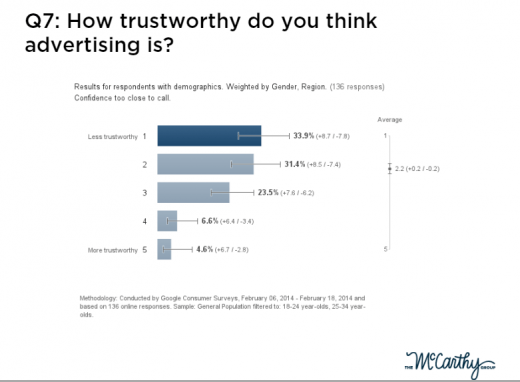Why we need to fight fake reviews
As a business owner, are you tempted to slip in a few positive reviews since you think everyone is doing it? Resist, says Contributor Wesley Young.

I have a growing concern about fake online content.
Last year, I wrote an article about eight different types of fake content and how the epidemic would hurt local search. It seems the problem is continuing to get worse, much worse.
Perhaps the most outrageous example of fake online content in the past year is the story of the Shed at Dulwich (the Shed). While this specific example itself doesn’t have much long-term impact on the industry, it does aptly illustrate how deeply both consumers and online sources can be so easily conned.
The Shed was an experiment dreamt up by Oobah Butler, who had previously been making ends meet as a “reviews-for-hire” writer. Based on his experience, he wanted to test how far he could fake it online by posting made-up reviews of a completely imaginary venue — a restaurant called the Shed at Dulwich.
The name came from the disarray in his backyard and the pictures on his website were of dishes thrown together from common household items and his own body parts. He used a toilet bowl puck and food coloring in one picture and a partial view of the heel of his foot in another.

Butler created a TripAdvisor profile for the Shed to launch his fake restaurant and test the impact of his reviews. As expected, it started dead last for restaurants in London on the site, ranked #18,149. But by gaming the system with fake reviews, the Shed slowly began to creep up in the rankings.
In order to prevent real customers from showing up and to create a mystique behind it, dining was advertised as by appointment only. He told the increasing number of callers that the restaurant was completely booked, which only seemed to have the effect of driving up the restaurant’s online reputation. Real consumers started posting real reviews on TripAdvisor about the Shed based on conjecture.
Incredibly, after 11 months of the hoax taking on a life of its own, the Shed became the #1 ranked restaurant in all of London on TripAdvisor. The restaurant rose over 18,000 spots in the rankings based on fake reviews and made-up phone calls.
This despite the fact that not a single real customer had visited the “restaurant.” Eventually, Butler did invite some customers to his backyard for a meal and managed to complete his illusion despite serving microwave lasagna and packaged entrees.
The story itself has limited real-life impact. TripAdvisor explained the fake site wasn’t caught because such a scenario is so unrealistic and the company doesn’t look for false businesses.
But the real-life application is significant: Can we trust the information we’re seeing online?
Can we trust what we see online?
Of all the areas in which fake information affects local search, reviews are likely of the most concern to local businesses.
Ooi Ming, co-founder of Fakespot.com, a site that analyzes Amazon products for reviewer authenticity, said:
As we ranked the products, it became pretty obvious that there are a lot of inauthentic and fake reviews online. This is probably an epidemic that hasn’t been talked about. I would say 40 percent of the reviews on Amazon are fake.
And from Yelp’s Senior Vice President of Global Corporate Communications Vince Sollitto:
This means about 25 percent of the reviews *submitted* to Yelp are not published on a business’s listing or recommended to consumers … [because they are ] likely to be fakes submitted by businesses themselves.
Yet there remains a lot of pressure on local businesses to maintain a high rating and receive positive reviews.
Reports from Bright Local state that 85 percent of consumers rely on reviews.
A study from Harvard Business School shows increasing a business’s online rating by one star causes sales to jump 5 percent to 9 percent.
That pressure, plus the readily available people offering to write positive reviews on behalf of any buyer, can make it hard to resist a little artificial stimulus. News outlets report review-writing services being advertised on online classifieds like Craigslist for as little as $5.00 a post.
Fellow Search Engine Land columnist Joy Hawkins even found Google local guides peddling fake reviews on a private Facebook group.
But businesses and marketers must stand firm against corrupting online content and reviews. Here are five good reasons to stand up against fake content.
1. Trust precedes substance
I mentioned before that 85 percent of consumers report that they trust online reviews. Maintaining that trust is important, and consumers are increasingly sensitive to information that challenges their brand loyalty. Reviews are part of your business content and reflect your reputation, whether positively or negatively.
Harvard psychologist Amy Cuddy found that people evaluate others by answering two questions in order:
Can I trust this person? and can I respect this person?
Trust is evaluated first, and only if the person is deemed credible is substance evaluated. Thus, as applied to a local business, it doesn’t matter how good you are at your trade or how good your food tastes if you don’t pass the first test.
Consumers who realize reviews are fake will move on from your business. And they’re pretty good at sniffing them out. Almost 80 percent of consumers say that they’ve spotted fake reviews.
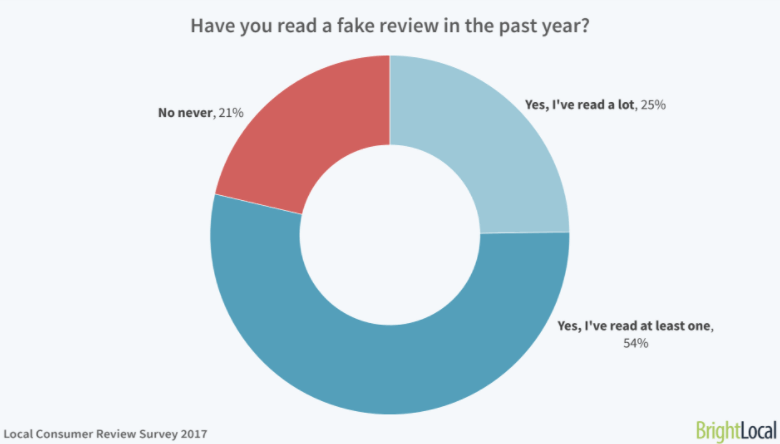
2. Short-term gains are a losing game
While you might get a temporary bump in business from artificially raising your star rating, the long-term risk is great.
Consumer behavior statistics reveal that customers are likely to stop patronizing your business if they feel misled by false reviews. When targeted with irrelevant information, 67 percent of consumers unsubscribed from email lists, 43 percent ignored future communications, 32 percent boycotted company media and 20 percent stopped buying from the company. The reaction to false information is likely to be even stronger.
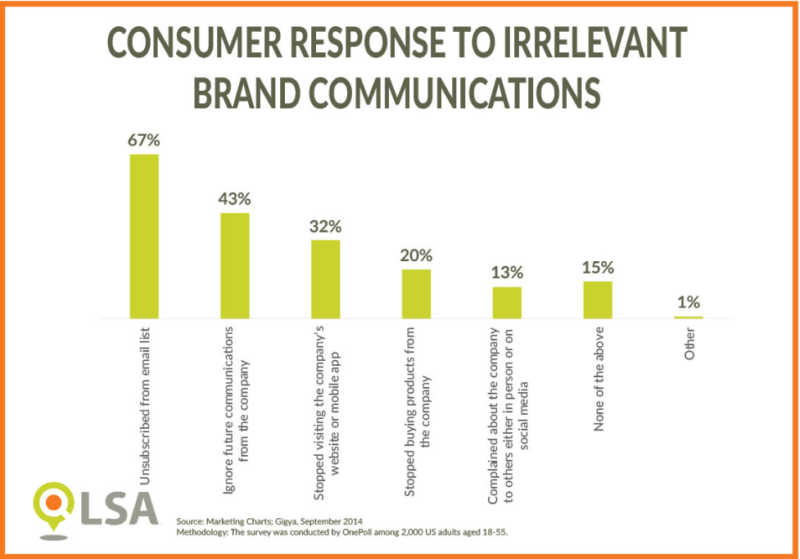
3. It’s a long fall from unrealistic expectations
Recently, a friend told me she would have walked right back into the theater to watch “The Greatest Showman” a second time. Unfortunately, that turned what should have been a good movie experience for me into a slight disappointment.
The problem is that when expectations are built up, it is much more difficult to meet them. The greater the expectation, the longer the fall to reality. Building up a super rating on false pretenses only does two things: It creates an expectation you cannot match and starts a trend that is not sustainable.
When consumer experiences don’t match expectations, the backlash will be hard including more negative reviews. Combined with inflated reviews, those high ratings cannot be sustained. Or it takes more false reviews to compensate, making the problem even worse.
4. Real is better than perfect
Online media has made it easier to share the good and hide the bad. Driven by social media, everyone from teens to seniors creates a persona of the perfect life. Fun vacations, trendy dining and unique experiences have dominated what we share with our friends. But there is a growing movement toward authenticity.
Advertisers are now emphasizing the virtues of the less-than-perfect and embracing diversity. Dove has cast models of all shapes, sizes, colors and styles in their “Real Beauty” campaign. Plus-size and Plus-50-aged models now grace the runways of New York and Paris.
Reviews constitute native content to be judged on its merits. That means the good and the bad. Too many five-star reviews often lead to a skeptical response.
According to a report from Power Reviews, 82 percent of consumers seek out negative feedback to get the full picture, based on the belief that the truth often lies somewhere in the middle.

Source: PowerReviews
5. Build for the future
Millennials are the future of local business. Not only will their income and purchasing power continue to grow, but according to Nielsen, they also have a particular appreciation for local goods and services that support jobs and the local communities they live in.
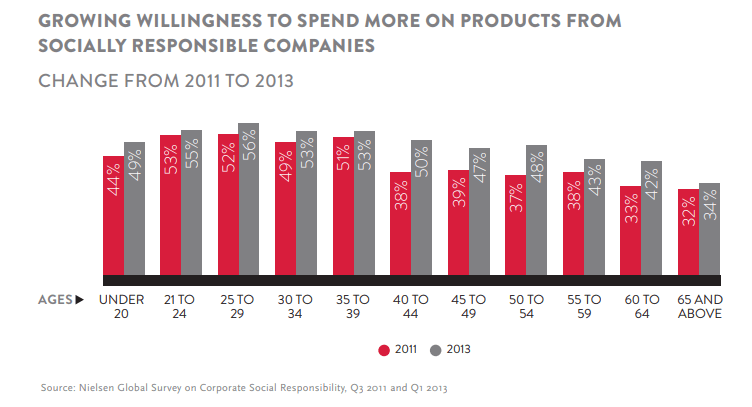
A whopping 84 percent of millennials say they don’t like advertising, according to a study by The McCarthy Group.
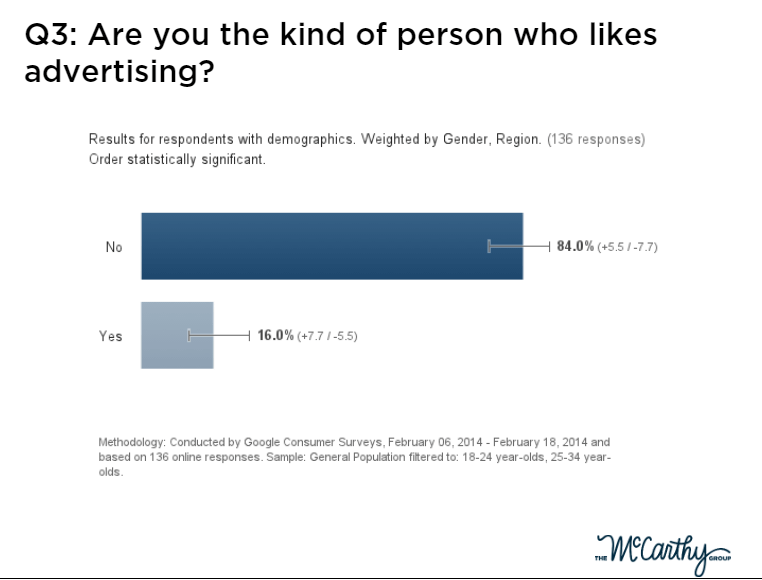
The reason is that they don’t trust it, ranking the trustworthiness of advertising only 2.2 on a scale of 5. That has often been translated into a dislike of the brands that advertise. False reviews will result in the same reaction to those businesses that use them
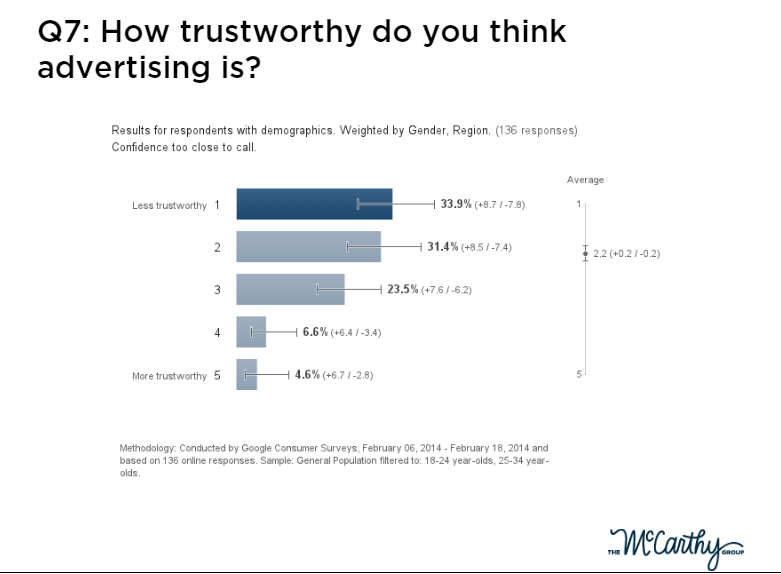
There are other risks associated with false reviews that jeopardize the long-term health of a business.
Getting caught can result in being blackballed by Yelp or Google. It is also illegal. Posting fake reviews is considered a deceptive practice subject to triple damages and attorneys’ fees imposed by most state consumer protection laws for private causes of action. Consumer protection agencies such as the FTC or state Attorneys’ General offices can also bring enforcement actions.
What about soliciting legitimate reviews from real customers?
This discussion would be incomplete without addressing what seems to be a viable solution to the fight against fake reviews: soliciting real reviews.
Yelp has taken a hard-line stance against soliciting any reviews, even from real customers and without any incentives. Its reasoning is that organic reviews are the only truly unadulterated and unbiased customer feedback. I believe there is also some desire to create a clear, bright-line policy that is easy to state and enforce.
Others argue that asking verified customers to give honest reviews would increase the number of reviews and improve the overall credibility of the content given the larger sample size. Yelp would point to research that shows solicited reviews result in biased higher grades than organic reviews. Supporters of solicited reviews say organic reviews show a negative bias.
It’s a gray area, and both sides are correct, depending on the circumstances. It may also be semantics, to some degree, as Yelp supports businesses encouraging customers to “check out” the business on Yelp. If there’s one thing all sides can agree on, it’s that truth is paramount.
In closing, it may be tempting to justify a boost in ratings with a few made-up reviews when you’re convinced everyone else is doing it. But the negative impact on your business far outweighs the temporary lift you might experience.
And it’s a lesson that applies to both sides of the marketing relationship. Local businesses must keep their marketers accountable, and marketers must resist any means that falsely boost the performance of their services.
Stay true and authentic to your customers and invest in the long-term health of your business.
[Article on Search Engine Land.]
Opinions expressed in this article are those of the guest author and not necessarily Marketing Land. Staff authors are listed here.
Marketing Land – Internet Marketing News, Strategies & Tips
(41)

